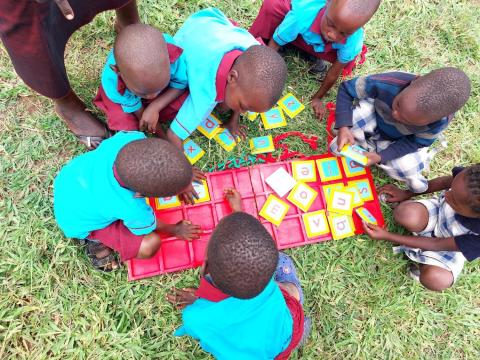The Vital Role of Play in Early Childhood Development at World Vision Uganda

By Viktorya Sargsyan, Senior Technical Advisor - Early Childhood Development and Education and Janet Birungi, MEAL Coordinator at World Vision Uganda
During a recent visit to Uganda, I had the privilege of witnessing the transformative power of an inclusive, playful parenting programme for children aged 0-6 years. This initiative not only targeted young children and their parents and caregivers but also aimed to engage faith leaders from various denominations and religions. The goal was to sensitise and involve these leaders in creating an environment that supports playful parenting, an essential component of early childhood development.
In some Ugandan communities, play is often under-valued, and children are expected to take on household responsibilities from a young age. Young children (girls and boys), for example, are frequently tasked with fetching water, while children under 10 are often responsible for looking after their younger siblings while caregivers are away to fend for the household. This cultural context made our mission even more critical.
One of the highlights of the trip was a meeting in Buliisa with over ten faith leaders. The event began with a brief sensitisation and orientation session. We discussed the rapid growth and development of the brain during early childhood and how these early years lay the foundation for abilities like social skills, emotional regulation, and stress responses. These foundational skills, formed in the early years, predict our trajectories for the rest of our lives.
Many of the faith leaders admitted that they were unaware of the science behind brain development and were eager to learn more about how they could promote and enhance child development within their communities. Their enthusiasm was a testament to the power of education and the potential for positive change.
When evaluating the project, one faith leader shared a profound insight during an interview:
This project taught me how to support children to play freely without limitations. The intervention prepares a conducive environment for children to play. Parents didn't have much hope and dreams for their children, but after the intervention, more parents have built hope and positivity in their children.
This statement highlights the significant impact of the programme. While traditional parenting, community life, and local culture offer valuable ways to support a child's development, such as through participation in family or community tasks like planting or harvesting, it's crucial to remember that children have a fundamental right to play. Play is not just a fun activity; it is a vital part of a child's development.
Early childhood is the only time in life when a child's primary "work" is to play. During play, children engage in activities that make them happy, interested, and engaged. These activities help them make sense of the world, learn, build foundational skills in relationships, negotiation, resistance to peer pressure, problem-solving, and decision-making—all essential skills for a productive future.
On this International Day of Play, let's celebrate and promote the importance of play in a child's life and the role of primary caregivers, parents in creating and engaging into play and learning opportunities for their children. By allowing children to play, we are not only respecting their rights but also laying the groundwork for a healthier, happier, and more successful future. Play is not a luxury; it is a necessity for the holistic development of every child. Let’s ensure that every child has the opportunity to play freely and joyfully, unlocking their full potential and brightening our collective future.